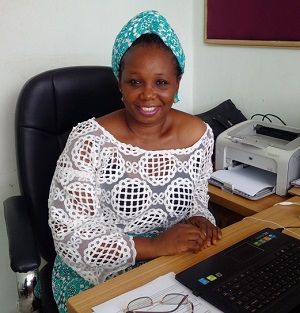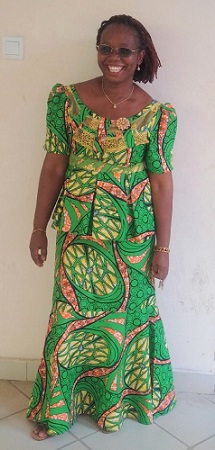“I’m not a typical lab scientist,” says Jackie Badaki, a Nigerian native. “I’m not interested in injecting a virus and watching for the solution to turn red or blue. But say you have a drug – I’m interested in the factors that lead people to accept it: the stigma, the behaviour and attitudes.”

As a PhD candidate, Badaki focused on lymphatic filariasis (LF), a parasitic disease of poverty endemic to large swaths of Nigeria, in Karaba state. “There is a form of stigma attached to it, so people hide,” she says. “It’s a disease of poverty, and there’s no treatment, so one can only manage it using simple hygiene.”
The stigma meant challenges in reaching patients. Because the microfilariae that cause LF only circulate in the blood at night, diagnosing active infection can be difficult and dangerous. “You need to take blood samples at very odd hours,” Jackie explains. Once, while visiting a patient’s home just after midnight, she was taken for an intruder and nearly beaten up. Still, she says, it was a risk she was willing to take. “I loved my work.”
Pregnancy and challenges in continuing her career
Midway through her studies, Badaki learned she was pregnant. Though she was excited to become a mother, stopping now, she knew, would put her career in jeopardy. “Prior to childbearing I was doing very well. But I had to take a break – I had to take care of the baby.” That meant abandoning the professional networks she had worked so hard to develop. Coming back, she discovered, even after just a short period away, was more difficult than she ever imagined. “You lose your place. People forget about you.”
Nevertheless, Badaki made her way, becoming a senior lecturer and, eventually, acting head of the department of environmental biology at Adekunle Ajasin University in Akungba-Akoko, Ondo State, where she mentored and supervised undergraduate students and developed a curriculum for a postgraduate programme in applied parasitology. “Jacqueline is one of my most outstanding former students,” says Dr Oladele Akogun, Badaki’s longtime mentor at the Federal University of Yola and principal investigator on the seminal TDR-supported study of community-directed interventions in three African countries.
We discovered in the whole of the northeast (of Nigeria) that we could not find any senior women scientists.
- Jackie Badaki
“She won a research grant from the African Programme for Onchocerciasis (APOC) before she had even finished her Master's degree, and later, when she applied for a university position, she was appointed to a higher rank than the one for which she had applied. I am happy she has started her own mentoring programme and I am sure she will do much better than I did mentoring her.”
Indeed, after becoming an assistant professor at the Federal University of Lokoja, Badaki watched as a younger colleagues struggled just as she had to balance the demands of family and career.
Starting a mentoring programme for women scientists
“I was thinking about how I could help them when I came across TDR’s call for proposals (on how to improve career development for women research scientists in infectious diseases of poverty),” she says. “I saw it as a great opportunity. We are in a male dominated culture here, and being in science can be very tough for a female. I wanted to compile empirical data on the problem in Nigeria so that we can develop a strategy for addressing it.”
With the TDR grant, Badaki was able to conduct a landscape analysis. The survey, which spanned seven institutions in four geographical zones, aimed to examine the reasons for women scientists’ under-representation in infectious disease research in Nigeria. Among the barriers identified were a societal bias against women, a lack of professional mentors and a lack of funding for research. And the under-representation was very real. “We discovered in the whole of the northeast that we could not find any senior women scientists,” she says.
 Following completion of the survey, Badaki used what remained of the TDR grant to hold workshops on proposal development and scientific writing. Thirty-three early career women scientists, all from the seven institutions surveyed, were selected to participate in the workshops. There, they learned everything from manuscript development to research ethics and grant writing – “indispensable skills that will lay the foundation for a long-term career in research,” says Badaki, who, along with other senior scientists, provided many of the participants with one-on-one mentoring.
Following completion of the survey, Badaki used what remained of the TDR grant to hold workshops on proposal development and scientific writing. Thirty-three early career women scientists, all from the seven institutions surveyed, were selected to participate in the workshops. There, they learned everything from manuscript development to research ethics and grant writing – “indispensable skills that will lay the foundation for a long-term career in research,” says Badaki, who, along with other senior scientists, provided many of the participants with one-on-one mentoring.
As a result, 10 of the participants formulated career development plans, and almost a fifth of the participants developed and submitted research articles for publication in peer-reviewed journals. But Badaki isn’t stopping there. “It’s not enough for me to do the workshops,” she says. “Mentorship can’t be a one-time thing; it has to be a continuous process.” To that end, she and colleagues have lobbied the Nigerian University Commission to endorse structured mentorship schemes for academic and research institutions across the country.
“Women scientists in Nigeria – we can’t run away from our family responsibilities,” she says. “But maternity leave affects employment, and we want institutions to take this into account – to appreciate the many challenges women face.”
For more information, contact:
Makiko Kitamura
TDR Communications Officer
Telephone: +41 22 791 2926
email: kitamuram@who.int

